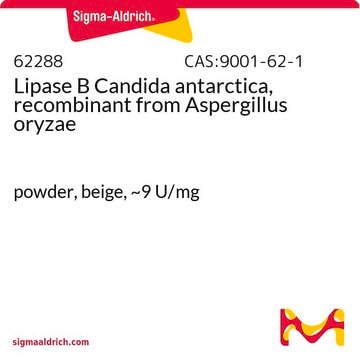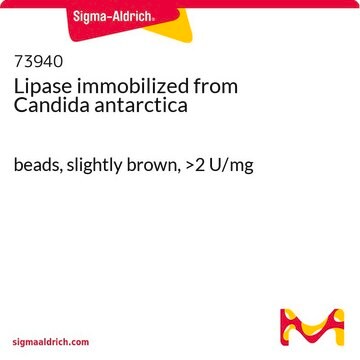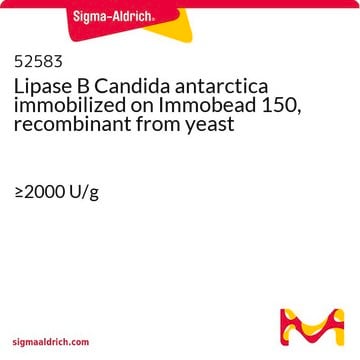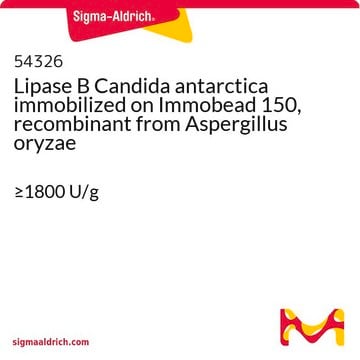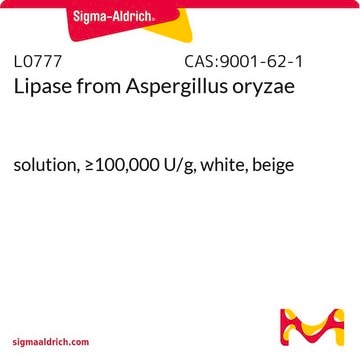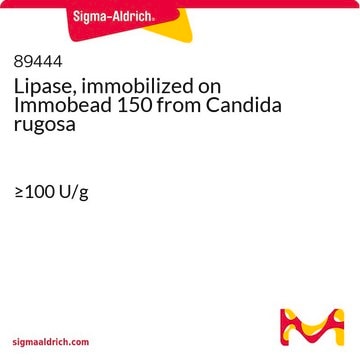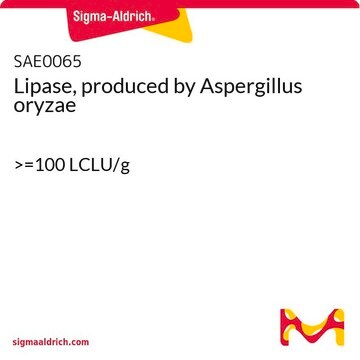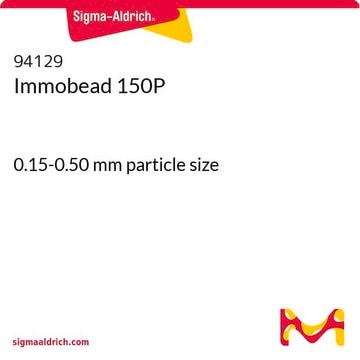This product is produced by submerged fermentation of a genetically modified Aspergillus niger microorganism and adsorbed on a macroporous resin.
L4777
Lipase acrylic resin
≥5,000 U/g, recombinant, expressed in Aspergillus niger
Synonym(s):
Novozyme 435
About This Item
Recommended Products
recombinant
expressed in Aspergillus niger
form
solid
specific activity
≥5,000 U/g
greener alternative product characteristics
Waste Prevention
Design for Energy Efficiency
Learn more about the Principles of Green Chemistry.
sustainability
Greener Alternative Product
matrix
macroporous acrylic resin
application(s)
diagnostic assay manufacturing
greener alternative category
storage temp.
2-8°C
InChI
1S/C11H9N3O2.Na/c15-8-4-5-9(10(16)7-8)13-14-11-3-1-2-6-12-11;/h1-7,16H,(H,12,14);/q;+1/b13-9-;
InChI key
QWZUIMCIEOCSJF-CHHCPSLASA-N
General description
Application
- as a catalyst to carry out the esterification of pLACT with butyric acid[2]
- as an additive in fully hydrogenated canola oil (FHCO) and high oleic sunflower oil (HOSO) blend for enzymatic interesterification[3]
- to study its effect on the degree of oleic acid conversion upon esterification[4]
Biochem/physiol Actions
Other Notes
Signal Word
Danger
Hazard Statements
Precautionary Statements
Hazard Classifications
Resp. Sens. 1
Storage Class Code
11 - Combustible Solids
WGK
WGK 1
Flash Point(F)
Not applicable
Flash Point(C)
Not applicable
Choose from one of the most recent versions:
Certificates of Analysis (COA)
Don't see the Right Version?
If you require a particular version, you can look up a specific certificate by the Lot or Batch number.
Already Own This Product?
Find documentation for the products that you have recently purchased in the Document Library.
Customers Also Viewed
-
Hello. I would like to ask if this lipase is Lipase B from Candida Antarctica, as this is not specified in the SDS or the specification sheet.
1 answer-
Helpful?
-
-
Is the supported enzyme reusable, and if so in which conditions?
1 answer-
This product is supplied by Novozymes and is commercially available as Novozym 435. The material may be reused for identical reactions. It is not recommended for use in different reactions due to the probability of cross-contamination and loss of activity. There is no estimation as to the number of times the product may be used. The link below may be useful in regeneration. This information has not been validated.
https://www.researchgate.net/figure/Regeneration-of-deactivated-Novozyme-435_fig7_313863272
Helpful?
-
-
What is the Department of Transportation shipping information for this product?
1 answer-
Transportation information can be found in Section 14 of the product's (M)SDS.To access the shipping information for this material, use the link on the product detail page for the product.
Helpful?
-
-
What are the components of Product L4777, Lipase acrylic resin, and what are the optimal recommended conditions?
1 answer-
This product consists of a thermostable lipase enzyme immobilized on a macroporous acrylic bead resin. The bead-shaped particles have a diameter in the range of 0.3-0.9 mm. The resin will be compatible with stearyl alcohol at temperatures of 40-60°C, which is the normal operating temperature of the enzyme. This immobilized enzyme can be used in hexane with no adverse effects.
Helpful?
-
-
What solvents are most compatible with Product L4777, Lipase acrylic resin?
1 answer-
This resin works well in solvent-free reactions, as well as in inert water immiscible solvents such as petroleum ether, n-hexane and n-heptane. If the reaction being catalyzed is hydrolysis of an ester, addition of water to the reaction mix is recommended. For other reactions water is likely not required, and in some cases would actually be detrimental.
Helpful?
-
-
What is the substrate specificity of Product L4777, Lipase acrylic resin?
1 answer-
Lipase acrylic resin has a broad substrate specificity. It promotes reactions between a wide range of primary and secondary alcohols and carboxylic acids.
Helpful?
-
Active Filters
Our team of scientists has experience in all areas of research including Life Science, Material Science, Chemical Synthesis, Chromatography, Analytical and many others.
Contact Technical Service